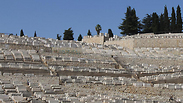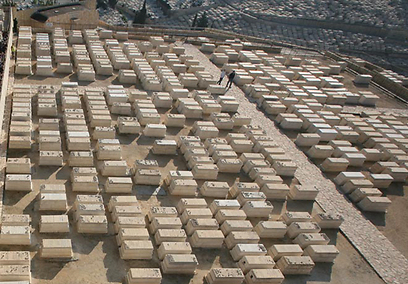
'For you are dust and to dust you will return
Photo: Gil Yohanan
Some 36,000 people are given a Jewish burial in Israel every year, and the land shortage is affecting cemeteries as well. The multi-level burial,
which was offered as a solution to the density issue, has become very unpopular and is gaining many opponents who prefer to be buried on the ground.
This method is considered economical as the tunnels can be dug in different angles, and it provides a halachic solution for populations that are refusing to be buried in multi-level graves.

An old-new solution is now in the works: Underground burial tunnels.
The idea is to build a network of burial tunnels under Jerusalem's Givat Shaul Cemetery and under Mount Carmel in northern Israel, similar to the catacombs of Paris and Rome. Hundreds of graves will be built in each tunnel.
Progress
Akiva Novick
Live funeral feeds, GPS coordinates to gravesites and Facebook-like page – Chevra Kadisha is upgrading its cyber-services.
The plan will be presented in detail at an international gravediggers' conference, which will be held in Israel in November for the first time.
"The method of burying people in underground chambers has been discussed several times in the past, and it's ideal as an alternative solution," says an official from Israel's burial society, Chevra Kadisha. "If this burial method is approved, the potential of underground burial is almost unlimited."
This burial method was implemented in a limited manner during the Sanhedrin era in the Second Temple period, but at the time the catacombs belonged to members of the higher classes due to the high cost of burial.

Jerusalem's Givat Shaul Cemetery. 'If this burial method is approved, the potential of underground burial is almost unlimited' (Photo: Gil Yohanan)
Eva Stern, 94, of Ramat Gan, doesn’t like this idea. "I prefer multi-level burial. The new cemeteries are much more pleasant, shaded and not hot," she says. "If my grandchildren come to visit, I don't want it to be a nightmare for them to have to search for my grave for hours and stand in the sun. Burial in caves is weird and claustrophobic.
"In any event, I am secular and I think that this is a country of life and we should not fill the entire state with graves."
Esther Gur, 86, of Bat Yam, is in favor of the tunnels. "If I'm not mistaken, burial in underground chambers existed during the time of our forefathers, and it's a method which takes very little room, so it's a very nice idea," she says.
"But I live in central Israel and I wouldn't want to make my family members travel all the way to Jerusalem. A visit to one's grave should not turn into a task, because after a few years people just stop coming.
"I already have a burial plot that my husband and I bought, but in retrospect it was quite a waste of money. If the burrows will be free, I think it's a better method because it actually fulfills the mitzvah of 'to dust you will return.'"
"Burial poses many challenges in different fields to those involved in it," says Avraham Manela, CEO of the Chevra Kadisha Forum. "Issues like the government's policy on the shortage of burial lands, national and local planning, a shift to new burial methods like saturated burial, double burial, etc, the funding of cemeteries' development and the ongoing maintenance of closed cemeteries, the development of engineering solutions and more are only some of the issues the upcoming conference will attempt to answer."
The conference will deal with all the issues facing Jewish burial officials in Israel and in the world and will expose the first ecological green cemetery in Kfar Saba.
About 600 people from Israel and abroad are expected to attend the conference, including Israel's chief rabbis, ministers, Knesset members, Chevra Kadisha representatives from across the country and officials from Jewish communities around the world.
Meanwhile, due to the decreasing popularity of multi-level burial, Chevra Kadisha plans to start collecting feedback from deceased people's families in a bid to improve its service.















